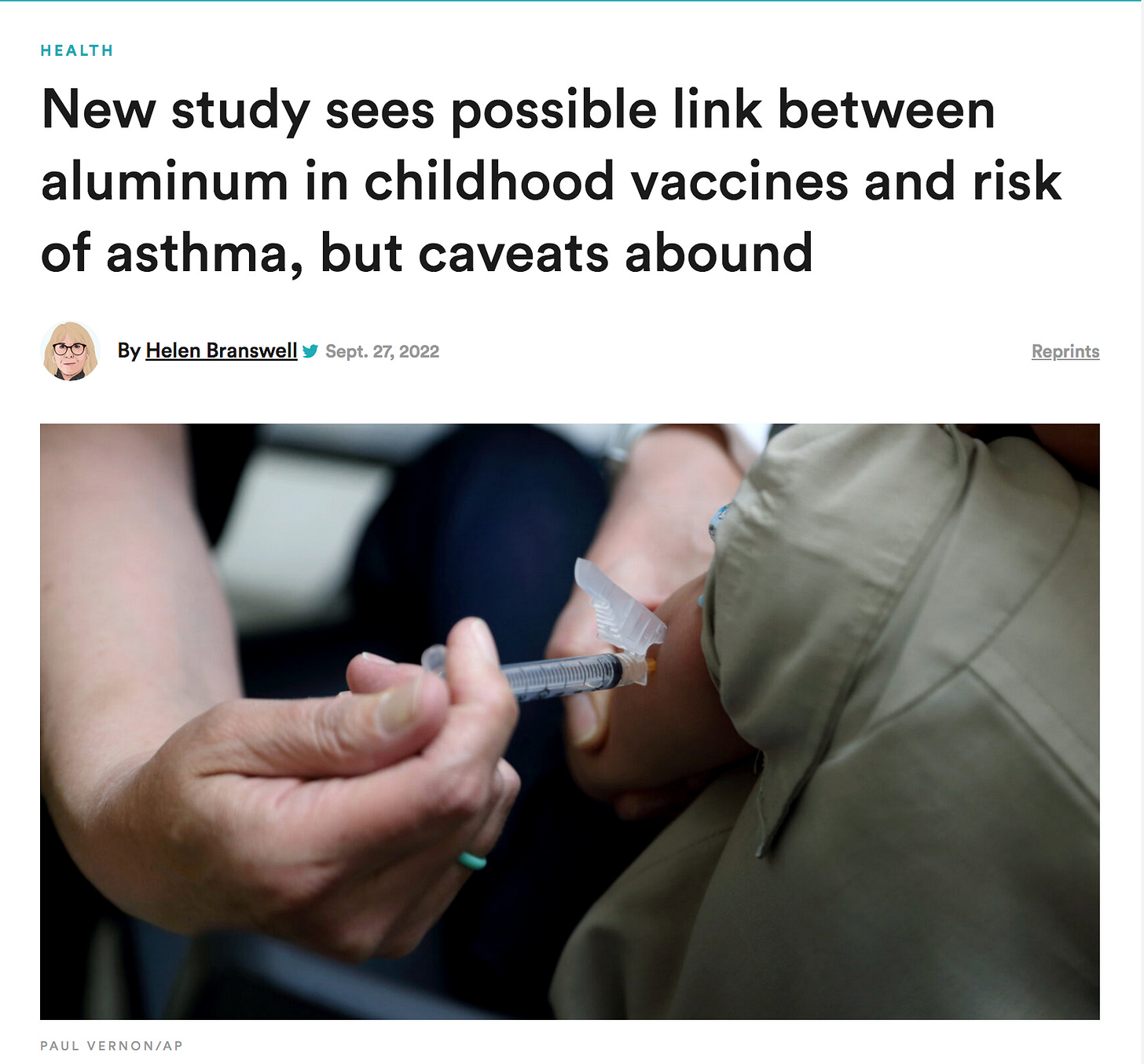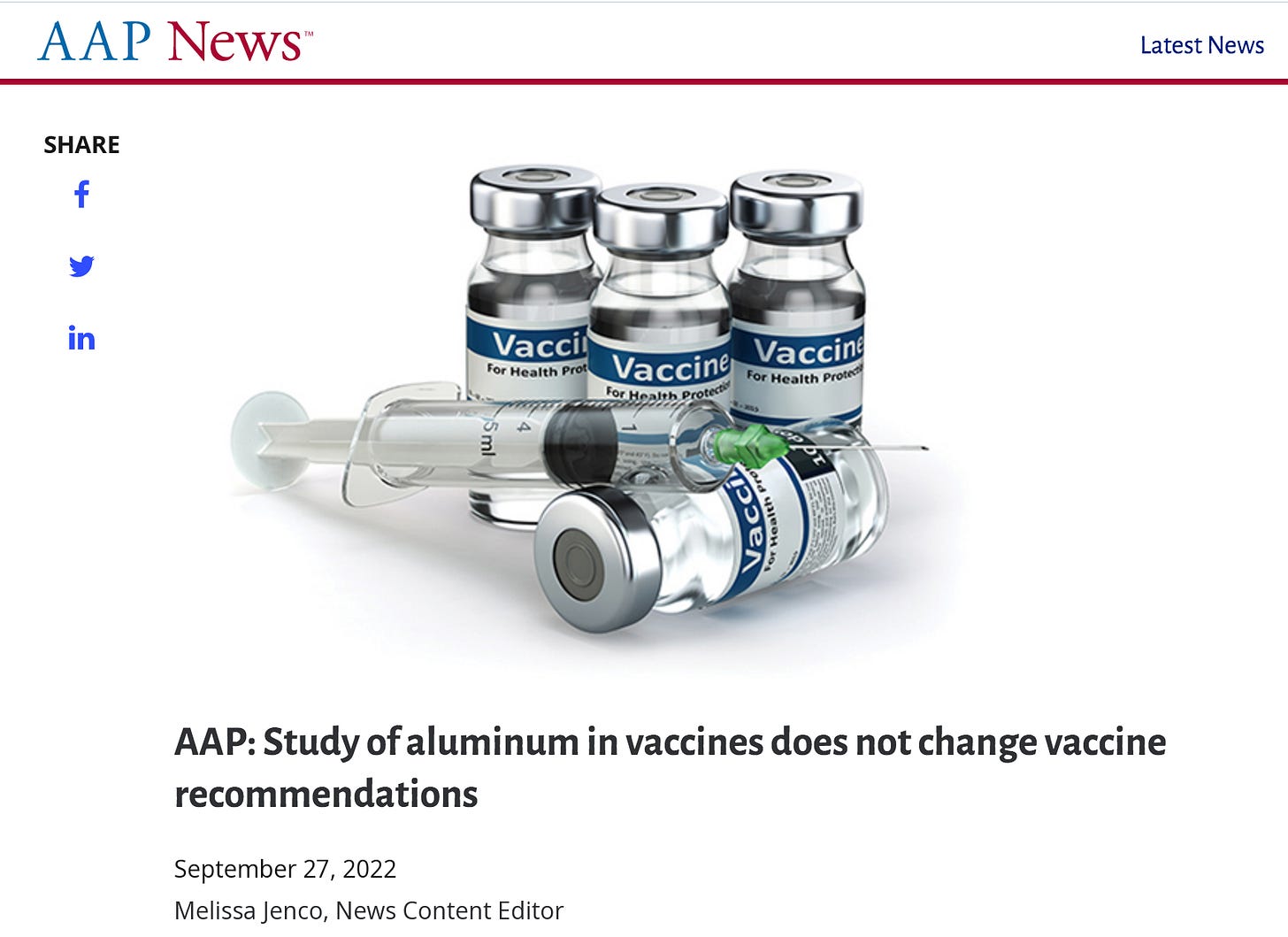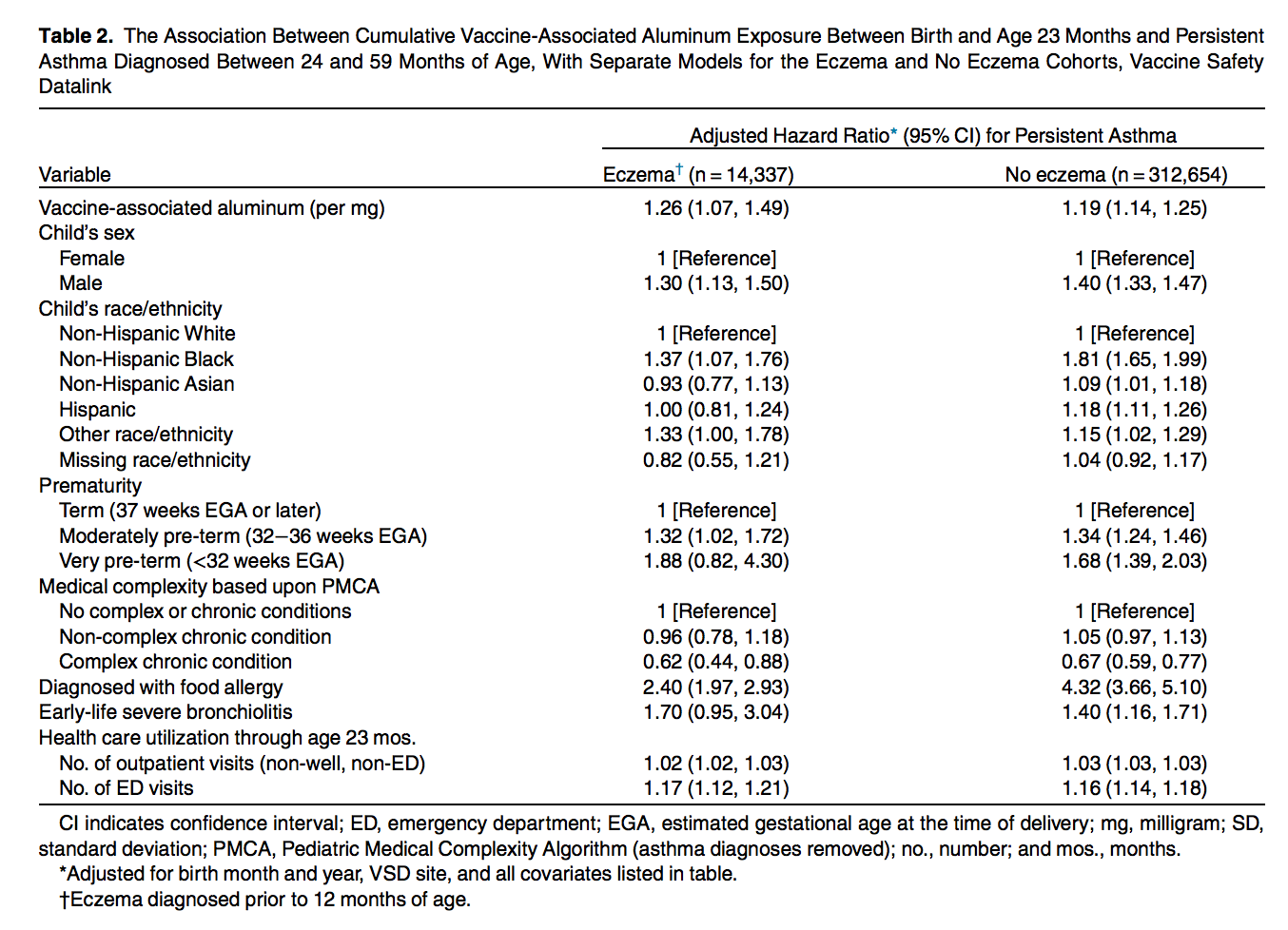Vaccine Aluminum Causing Asthma: Real or Rubbish?
A new study finds a correlation between infant exposure to aluminum-containing vaccines and the risk of developing childhood asthma, but the evidence is underwhelming.
This week, a study dropped that is likely to cause ripples in the pond of vaccinology for quite some time. It found a link between the amount of aluminum children received via vaccines in their first two years of life and their risk of developing asthma in their next three. I’m skeptical about the study, but it is an extremely interesting development in this subset of the vaccine safety question, one worthy of consideration.
There is some background to all this, for the uninitiated. Aluminum salts are added to about half of childhood vaccines as an adjuvant — something to stimulate an immune response to the antigen of the vaccine, allowing less vaccine to induce more effect. It’s inexpensive, has been used for decades, and would be hard to replace in the types of vaccines that require adjuvants. (Live, attenuated vaccines, like MMR and varicella, and the mRNA and adenovirus vector vaccines, like our Covid vaccines, are examples of vaccines in which our own cells present enough target proteins to our immune system to not require an adjuvant).
15 years ago, Dr. Bob Sears, MD, he of the Sears lineage of pediatric royalty, published a best-selling book by the name of The Vaccine Book: Making the Right Decision for Your Child. I bought myself a copy soon thereafter, in 2009 (or so my Amazon.com account informs me). At the time, I was impressed by the book. It reads as a thoughtful discussion of the risks and benefits of each vaccine on the CDC immunization schedule, with a non-dogmatic flavor and trustable voice. As a busy new-ish doctor and very new father, I didn’t find the time to look into some of the more controversial claims of the book; after all, he was the famous pediatrician with the best-selling book, and I was just a harried family doctor.
Foremost among Dr Sear’s concerns was the repeated assertion that the current vaccination schedule puts too much aluminum into the arms of our children, and we’re wise to consider spacing out vaccines more widely to avoid the risks of this toxic metal. Here he states it when reviewing the Hib vaccine:
Few books have irked pediatricians and vaccine-promoting physicians in general more than this slim green manual. Hidden in it’s balanced delivery is an unspoken bias against conventional immunization recommendations, one that often fails to observe better scientific practices. In the case of aluminum, which is rapidly excreted from the bodies of any child with minimally functional kidneys, no association was found between vaccination status and the amount of aluminum in infants’ blood or hair. Perhaps this is because aluminum is ubiquitous; our third most abundant element behind oxygen and silicon (at least I could have guessed oxygen out of the top three), it is found in our food, beverages, and even breast milk. I don’t want to say that the science is fully settled on the subject of aluminum toxicity from vaccination, but I will note that most of the research still claiming its dangers is coming from people who, like Dr. Sears, are writing books suggesting alternative vaccination schedules.
This, then, is the backdrop upon which our bombshell study dropped. Here is the headline, from an informative STAT news story:
A reputable pediatrician and researcher, Dr Matthew Daley, working with a group of genuine vaccine researchers, published this observational study of over 300,000 children in a peer-reviewed journal, Academic Pediatrics. The research found a statistically significant correlation between the amount of aluminum infants received from vaccines in their first 2 years of life, and their risk of developing asthma between ages 2 and 5. Roughly speaking, for every additional 1 mg of vaccine aluminum, the risk of asthma went up 26% in children with eczema as infants (which correlates with asthma risk later in childhood) and 19% in the larger group without eczema. This implied around twice the risk of developing asthma for children given the full slate of vaccines, which averaged around 4mg, over those with minimal vaccine exposure.
Needless to say, the study was not happily received by the medical establishment.
From the American Academy of Pediatrics there was a response the day the study was released:
My American Academy of Family Physicians also weighed right in:
Dr Paul Offit, co-inventor of the rotavirus vaccine and longtime vaccine über-advocate (who has not been afraid to make enemies in the establishment with his questioning of the party line on Covid-19 vaccinations), shared his feelings on a podcast before the proverbial ink had dried on anyone’s copy of the article. It’s worth a listen, like most of Dr Offit’s podcast appearances. For those without 25 minutes of available time, the short summary is that Offit discounts the study — not very politely — primarily on grounds that a) the study is meaningless because it fails to account for confounders; b) the authors deposit their confounded data on us without bothering to provide a plausible mechanism by which aluminum could cause asthma; and c) there are no reasonable grounds by which aluminum in vaccines could be toxic.
I generally agree with Dr Offit, but in this case, I do not. That said, I tend to form a similar, if softer, conclusion: this study does not give us grounds to panic that we are harming our children with the aluminum in our current vaccine schedule.
The biggest concern with observational data of this sort is bias. Is it possible that children who skip most vaccines altogether, or only receive a limited regimen, are fundamentally different than children who get a full slate? Of course! Since white, higher income, private school students are more likely to get vaccine exemptions, one might expect this group to develop less asthma since asthma is more prevalent in lower socioeconomic status groups and people of color. On the other hand, since children of color tend to have modestly lower infant vaccination rates, the lowest aluminum exposures might be in those at highest risk for asthma. It’s hard to tease out such confounders in an observational study. However, Dr. Offit’s assertions to the contrary, the authors did try; several variables were adjusted for in their model:
That’s the list of variables they attempted to control for in the study; as a retrospective study, they didn’t get to choose what data to gather from the Vaccine Safety Datalink data base. Interestingly, they include a table in the Supplement which shows that none of these variables more than minimally altered the risk of asthma relative to aluminum exposure. Adjustment for these variables is better than nothing, but it does leave out some important confounders, which the authors admit in their discussion:
I don’t think this kills the paper quite the way Dr. Offit asserts. I do think, however, that it depletes the strength of their conclusions.
As to the rest of Dr. Offit’s objections, I also disagree that the authors fail to postulate a mechanism by which aluminum exposure could lead to asthma. I will readily admit that high level immunology is well out of my wheelhouse, but the basic theories put forth by the authors strike me as plausible. Put simply, there is a well-known tension between Th1 (T-helper type 1) and Th2 (T-helper type 2) responses to immune stimuli; both are helpful in the right amount at the right time, but the Th2 immune response leads towards the allergic, IgE-type activity which we probably evolved to fight large parasites, but now mostly gets us into trouble with issues like eczema and asthma. The virus and bacterial fighting properties of Th1 responses are a primary target of vaccines, but allowed to run amok can lead to autoimmune diseases like type 1 diabetes and rheumatoid arthritis. The authors share the rather uncontroversial theory that aluminum adjuvants have been shown in animal models to skew towards a Th2 response. It strikes me as biologically plausible that exposing an infant to 4 or 5 aluminum-containing vaccines aimed at a provoking a strong immune response, possibly tilted towards the Th2 end of the spectrum, on 5 occasions in the first 2 years of life, might possibly lead towards a higher risk of developing a Th2-mediated problem like asthma. “Plausible” and “possible” are doing a lot of the heavy lifting here, I grant you, but that’s the nature of science.
Dr Offit won my respect as a straight-shooting voice in the pandemic by being willing to acknowledge the emerging data that vaccine-induced myocarditis was a real problem, especially pertaining to boosters for the young men most at risk of this complication, despite his very establishment role advising the FDA as a member of the Vaccines and Related Biologics Advisory Committee. Especially then, the mechanism of post-mRNA-vaccination myocarditis was not well understood; but what we had was a plausible mechanism and clear data connecting the dots. No one, including Dr. Offit, required that the papers published on the subject included heart biopsy data or autopsies on vaccinated mice showing immune-mediated myocarditis; the data spoke for itself. I grant you, the data on aluminum and asthma merely mumbles, but I don’t discount the possibility simply because the authors conducted an epidemiological study without fresh biological evidence.
I also think the effort to steer this topic towards one of aluminum toxicity is mis-guided. Dr Sears, obviously, was stuck on this point, and it creates a terrible sense of doubt in parents — “Am I poisoning my child with these vaccines?” Again, I acknowledge that comparing repeated exposures of injected aluminum to similar amounts of orally consumed aluminum, as does Dr Offit’s home institution, the Children’s Hospital of Philadelphia, is a bit disingenuous. It appears only a tiny proportion of the aluminum found in our food and drink actually gets absorbed into our bloodstream, even if our daily diet matches the aluminum amounts in vaccines. Aluminum injected into our muscles or under our skin will be absorbed into our bloodstream in far higher amounts, although we lack convincing evidence that this amount would be “toxic” or dangerous in some way, since it is readily excreted.
The question, really, is whether aluminum’s role as an adjuvant, dosed repeatedly in early life, could program our immune responses to trend towards Th2 pathways and increase asthma incidence. That’s not a toxicology question, it’s an immunology question. It’s important to ask immunology questions when studying the overall benefit of vaccines!
To that end, I welcomed this study. The unwelcome part is that it is being used as fodder by anti-vaxers, to no one's surprise.
However, followers of Robert F. Kennedy and the “Children’s Defense Fund” probably didn’t need this study to justify their vaccine exemptions. The vast majority of American parents, who follow their pediatrician’s recommendations around childhood vaccinations, won’t suddenly stop in the middle of their immunization plans. However, those who like to feel like science is still being done on the subject of childhood vaccine safety should rightly feel reassured that even the uncomfortable and inconvenient questions are still being asked.
On balance, I suspect that a better-designed, prospective study (i.e., a study started now, with control over the selection of available data) with thorough matching to reduce the role of critical potential confounders like breast feeding and family asthma history, would not find a significant difference on asthma rates between fully and lightly vaccinated kids. I’d like to see that data, though.
It’s also possible that we would see benefits that might more than make up for any possible shift towards higher asthma incidence; perhaps a well-designed study would find the theoretical trend away from Th1 responses lead to a lower rate of diabetes or juvenile rheumatoid arthritis, or reduced all-cause hospitalizations, in a group receiving the full aluminum dosage. These so-called “off-target” effects of vaccination remain an area of controversy and great interest. The “on-target” effects — you know, not seeing deadly Hib infections, tetanus, hepatitis A or B, etc. because of these vaccines — justify a moderately increased risk of asthma, in the rather unlikely event this study turns out to be validated by later research.
If further study revealed a genuine concern, and the current immunization schedule called into question, it’s not a disaster. It’s an opportunity to improve children’s health. The current schedule is not writ into stone, Ten Commandments style. It could be adjusted, and studied. Also, I’m again reaching above my pay grade here, but it seems the world is not without adjuvant alternatives to aluminum, with options like calcium phosphate or microcrystalline tyrosine under study.
None of this is convenient, or inexpensive. Good faith science, though, sometimes runs this way. Probing at what constitutes medical reality comes first, and honest communication on its heels.
Like the AAP and AAFP, I am not going to change my recommendations to parents in my practice based on one inherently limited study. But I will keep my ear to the ground.










Good analysis Dr. Hollander. It is a very murky subject, contentious at times, and not for the faint of heart physician to tackle. So thank you for grappling with it publically, for all of us to bear witness. I agree with your interp and conclusions, with one caveat. I strongly suspect that if we were to adjust for genetic polymorphisms that predispose towards an IgE mediated diathesis (eczema, asthma, anaphylaxis/hives, food allergies, etc.) that we would find that kids who are genetically predisposed are the ones whose immune systems respond adversely to injectable aluminum in these bolus dosing patterns. Certainly, if we look at the rainbarrel theory that the allergy world often refers to, there is thought to be a tipping point with which the rainbarrel begins to overlow once a specific immunologic threshold has been surpassed. The overflowing represents the onset of symptoms, be it eczema, asthma, but the exposure represents a 'trigger.' This is confused as a toxicity effect because heavy metals are thought of as toxins, and you poignantly address the fact that Aluminum is present everywhere in nature, including within our bodies at baseline, so it is not a toxin by nature. In fact, any inert substance such as water and air can become toxic to our bodies and quickly become fatal in excess doses. I've been, not so secretly, hoping/praying for genetic polymorphism screening of everyone, for a panoply of reasons (choosing the best suited medications and foods/diet, etc.), but mostly because it is tech that is no longer prohibitively expensive, and only serves to improve health outcomes by helping shed light on some of our frustrating blind spots in medicine. I can't think of a more appropriate population to screen than infants. Let's face it, vaccinations are elective preventative interventions that work really well in general and have saved millions of lives over the relatively few decades since the oral polio vaccine emerged (okay, it was actually the cowpox vaccine first). But we need to do better to minimize harm from such preventative interventions. The way I see it, we have two options. We either perform routine genetic screenings to identify the relatively few kids who react adversely to vaccines and then put them on delayed schedules, OR, we put everyone on a slow schedule to reduce the risk of the few. We have the tech, the resources, and the inventiveness to carry this out, we just need to decide that it will be equitable and worth the upfront expense of universal testing (elective of course). I believe that we owe this to our kids.
Thank you for having the courage to explore the issue of vaccine safety. We know that some FDA medications are safe and effective while there is a long history of medications that turned out to be harmful ( Vioxx, thalidomide, but there are literally hundreds). So why is it a taboo to question any vaccine, ever? How can anyone say "vaccines are safe"? That is like saying " medications are safe." Some are, some aren't. There should be a risk/benefit analysis.
Hepatitis B is routinely given to newborns. Why? most newborns are not exposed to HepB. The mother could be tested to see if she has it before routinely giving the vaccine. It's time to become more honest about vaccines. In 1961 most children got about 5 vaccines total. Today the recommended schedule is 72 vaccines. Thats a lot of aluminum by the way!